Iran Announces New Nuclear Violation
President Hassan Rouhani directed the Atomic Energy Organization of Iran (AEOI) to introduce uranium gas into centrifuges installed at the Fordow facility on Nov. 6, violating the prohibition on enrichment activities at the site put in place by the 2015 nuclear deal.
Iran’s decision to begin enriching uranium at Fordow under international supervision is a serious breach of the nuclear agreement, known as the Joint Comprehensive Plan of Action (JCPOA). While the step does not pose a near-term proliferation threat, it risks eroding European support and closing the window on negotiations to restore full compliance with the agreement.
Rouhani emphasized in his Nov. 5 statement that the action is reversible and said there is still time to negotiate “win-win conditions” to preserve the deal.
However, French President Emmanuel Macron said on Nov. 6 that Iran appears to have decided in “an explicit and blunt manner” to leave the JCPOA, which he described as a significant shift. Macron has spearheaded efforts to bring Tehran and Washington back to the negotiating table.
Reportedly, Rouhani and U.S. President Donald Trump agreed in principle to a proposal from Macron in late September that included commitments for the United States and Iran to return to compliance with the accord, negotiate a “long-term framework” for nuclear activities and discuss regional activities, but disagreements over sequencing prevented any direct negotiations.
British Foreign Secretary Dominic Raab said on Nov. 5 that Iran’s moves “pose a risk to national security”, but said the United Kingdom wants to “find a way forward through constructive international dialogue.”
Specifically, Iran resumed enrichment to 4.5 percent uranium-235 using 696 IR-1 centrifuges at the Fordow site, Behrouz Kamalvandi, spokesman for the Atomic Energy Organization of Iran (AEOI) said Nov. 6. The remaining 348 machines will be used for stable isotope production, he said. Iranian newspapers reported that 2,000 kilograms of uranium hexafluoride gas (UF6) had already been transferred to Fordow.
Under the terms of the JCPOA, Iran was permitted to retain 1,044 IR-1 centrifuges at Fordow but was prohibited from conducting uranium enrichment at the site for 15 years. The agreement specified that Russia would assist Tehran in converting the facility to a medical isotope production and research center.
Prior to negotiations on the JCPOA, Iran had installed about 2,700 IR-1 centrifuges, of which 696 were being used to enrich uranium to 20 percent uranium-235, at the site, which is located deep inside of a mountain.
U.S. Secretary of State Mike Pompeo said in a Nov. 7 statement that Iran’s “expansion of proliferation-sensitive activities raises concerns that Iran is positioning itself to have the option of rapid nuclear breakout.”
While resuming enrichment at Fordow is a serious breach of the JCPOA, Iran’s announcement appeared carefully calibrated to signal that Tehran’s motivation is to increase pressure on the remaining parties to the deal and that Iran does not intend to pursue nuclear weapons.
Resuming enrichment to 4.5 percent uranium-235 at Fordow using 696 IR-1 centrifuges does not pose a near-term proliferation risk, although over time it will contribute to the slow erosion of Iran’s so-called breakout (the time it would take to produce enough material for a nuclear weapon), which was 12 months when the JCPOA was fully implemented.
Additionally, Iran’s mission to the International Atomic Energy Agency (IAEA) also tweeted on Nov. 5 that Tehran sent a letter to the agency informing it of the Fordow decision and requesting that inspectors monitor the introduction of uranium to the centrifuges. The IAEA presence at the site provides assurance that Tehran is not diverting nuclear material for a weapon and that any further deviations will be quickly detected.
Rouhani’s announcement came the day after Ali Akbar Salehi, head of the Atomic Energy Organization of Iran, confirmed that Tehran is operating 60 IR-6 centrifuges. Rouhani announced in September that Iran will no longer be bound by the research and development restrictions for advanced centrifuges in the deal.
Rouhani said Iran will take further steps in 60 days the remaining parties to the JCPOA do not “fulfill their obligations” and “secure Iran’s interests.”—KELSEY DAVENPORT, director for nonproliferation policy, and JULIA MASTERSON, research assistant
U.S. Renews Nonproliferation Waivers
The Trump administration renewed sanctions waivers for specific nonproliferation projects detailed in the JCPOA.
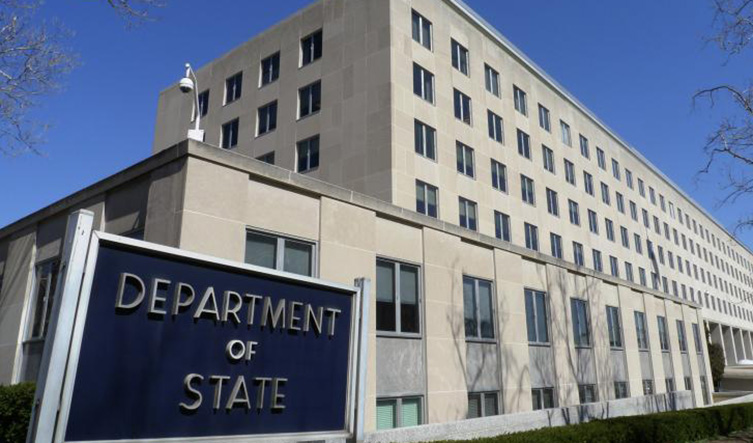 In an Oct. 31 statement, the State Department stated that the decision will “help preserve oversight of Iran’s civil nuclear program, reduce proliferation risks, constrain Iran’s ability to shorten its ‘breakout time’ to a nuclear weapon and prevent the regime from reconstituting sites for proliferation-sensitive purposes.”
In an Oct. 31 statement, the State Department stated that the decision will “help preserve oversight of Iran’s civil nuclear program, reduce proliferation risks, constrain Iran’s ability to shorten its ‘breakout time’ to a nuclear weapon and prevent the regime from reconstituting sites for proliferation-sensitive purposes.”
The State Department statement did not specify what projects were covered by the waivers, but it likely includes:
- work to modify the Arak heavy-water reactor so it will produce significantly less weapons-grade plutonium than necessary for a bomb on an annual basis,
- conversion of the Fordow facility from a uranium enrichment site to a research and medical isotope facility (the Trump administration may revoke the Fordow waiver given Iran’s decision to resume enrichment at the site – see above),
- and support for operating the existing Bushehr power reactor and the Tehran Research Reactor.
These projects are required by the JCPOA and serve U.S. nonproliferation interests by making it more difficult for Iran to use existing civil nuclear facilities for illicit purposes. (For more information on the value of the work at Arak, Fordow, and Bushehr see “Understanding the U.S. Moves on JCPOA Nonproliferation Project Waivers.”)
Despite the clear nonproliferation benefit of these projects, Republican members of Congress are seeking to block the Trump administration from continuing to grant the waivers. In a Nov. 5 joint press release, Representative Liz Cheney (R-Wy), Senator Ted Cruz (R-Texas), and Senator Lindsay Graham (R-S.C.) said the waivers “dangerously increase the risk of proliferation” and called for an end to the waivers. The release said they are working on legislation to “reverse the civil nuclear waivers and hold Iran accountable.”
The State Department release did not specify how long the waivers last, but they are likely valid for 90 days. The waivers could be granted for up to 180 days, but in May the Trump administration stated that the duration of the waivers would be cut in half and warned that they could be revoked at any time.
Prior to the announcement, Ali Asghar Zarean, special assistant to the head of the Atomic Energy Organization of Iran (AEOI) said that progress was being made on the Arak rector conversion project. He said on Oct. 21 the reactor will be fully operational within two years.
Iran has also gone ahead with work on new units at the Bushehr nuclear reactor site. Russia’s Rosatom is contracted to build the units, and the Ali Akbar Salehi, head of the AEOI, said on Oct. 15 that concrete will be poured for unit two (unit one is the reactor that is already operating) in October and the reactor will become operational in 2025. He said everything is moving forward in “an excellent manner.”
The United States did not renew waivers for assistance on new power reactors at the Bushehr site in May, and said that any work at the site beyond maintaining and operating the current reactor “will be exposed to sanctions.”
Iran and EU Hold Nuclear Workshop
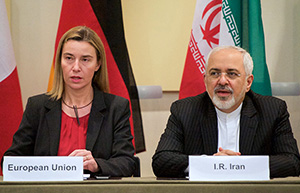 Iran and the European Union held a workshop on nuclear safety in Luxembourg Oct. 21. Specifically, the two-day workshop focused on emergency preparedness and response.
Iran and the European Union held a workshop on nuclear safety in Luxembourg Oct. 21. Specifically, the two-day workshop focused on emergency preparedness and response.
Iran and the European Union have held a number of workshops and meetings on activities laid out in Annex III of the JCPOA, which addresses civil nuclear cooperation. The majority of the projects described in Annex III are voluntary and include nuclear safety and security activities.
Stephan Klement, the EU Ambassador to the IAEA, said on Oct. 21 that enhancing nuclear safety cooperation is crucial for Iran and the region. He noted that a “nuclear accident anywhere is a nuclear accident everywhere.”
Poll Shows Decline in Iranian Support for the JCPOA
Less than half of Iranian citizens approve of the JCPOA for the first time since 2015, according to recent public opinion polling conducted by the Center for International and Security Studies at the University of Maryland and IranPoll.
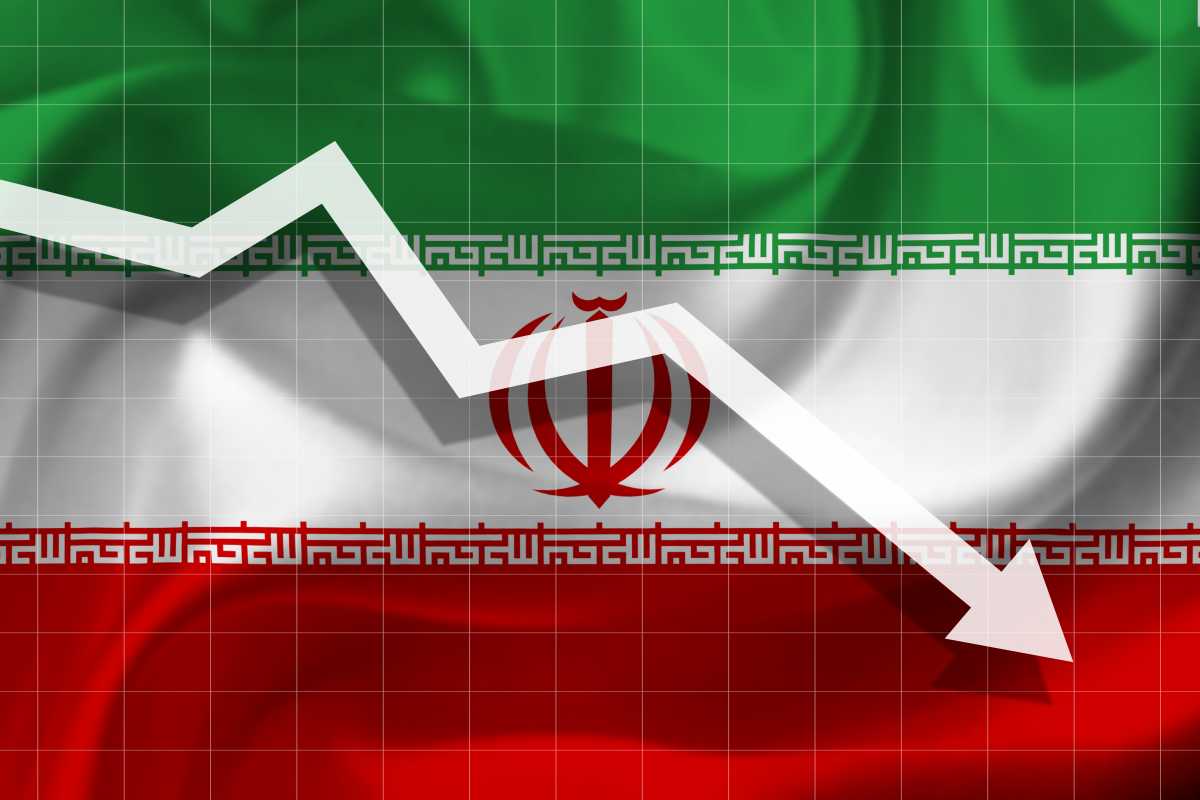 Domestic approval of the deal peaked in August 2015 when more than 85 percent of Iranians backed it, according to the center’s polling data at the time. Responding to a question of what Iran should do “if other P5+1 countries remain committed to the agreement and try to maintain their trade relations with Iran despite US sanctions,” nearly 59 percent in 2019 say Iran should follow the United States in withdrawing from the JCPOA. Sixty-nine percent of Iranians are not confident that Russia, China, and the European members of the deal will remain able to circumvent U.S. secondary sanctions and provide Iran with the benefits promised under the joint agreement.
Domestic approval of the deal peaked in August 2015 when more than 85 percent of Iranians backed it, according to the center’s polling data at the time. Responding to a question of what Iran should do “if other P5+1 countries remain committed to the agreement and try to maintain their trade relations with Iran despite US sanctions,” nearly 59 percent in 2019 say Iran should follow the United States in withdrawing from the JCPOA. Sixty-nine percent of Iranians are not confident that Russia, China, and the European members of the deal will remain able to circumvent U.S. secondary sanctions and provide Iran with the benefits promised under the joint agreement.
While polling shows that Iranian citizens endorse staged breaches of the nuclear accord, three-quarters of Iranians support future multilateral negotiations pending a U.S. return to compliance with the deal. The majority, however, does not believe that the United States will return to the JCPOA, regardless of the outcome of the 2020 election.
According to the poll, the Iranian public would approve of negotiations with a restored P5+1. However, the majority of Iranians polled express that Iran’s ballistic missile program is itself not up for negotiation—which the Trump administration insists must be part of any future talks—and 60 percent view Iran’s ballistic missile program as “an effective deterrent.”
Public opinion on the Iranian economy has not changed since the reimposition of sanctions. Although seven out of ten Iranians consider the economy “bad,” this percentage closely mirrors earlier polling in 2018, before the United States withdrew from the JCPOA.
The report, published in October 2019, includes findings from surveys conducted in May, August, and October 2019.
Senate Holds Hearing on Iran Policy
U.S. State Department Special Representative for Iran, Brian Hook, testified before the Senate Foreign Relations Committee on the status of U.S.-Iran policy.
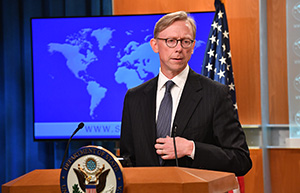 Hook said in the Oct. 16 hearing that renewed U.S. economic sanctions on Iran have two objectives: “to deny the regime the revenue it needs to fund a revolutionary and expansionist foreign policy,” and “to increase the incentives for Iran to come to the negotiating table.”
Hook said in the Oct. 16 hearing that renewed U.S. economic sanctions on Iran have two objectives: “to deny the regime the revenue it needs to fund a revolutionary and expansionist foreign policy,” and “to increase the incentives for Iran to come to the negotiating table.”
Hook said, Iran’s “decision-making calculus” has historically been influenced only by economic pressure, diplomatic isolation, or the threat of military force.” Nevertheless, Hook invited talks with Iran “without preconditions” and said, “this is an administration that is very open to resolving our differences with Iran at the negotiating table and diplomatically.”
Pushing back against an earlier statement by Senator Bob Menendez (D-NJ), who questioned the efficacy of the Trump administration’s maximum pressure campaign, Hook reiterated the administration’s position that absent the U.S. reimposition of sanctions, Iran would have continued “amassing revenue from abroad because the [2015 nuclear deal] encouraged business with Iran, while funneling maximum effort and money into missile development, missile proliferation, support for terrorism, and regional destabilization.”
The U.S. maximum pressure campaign began in May 2018 after the Trump administration withdrew from the 2015 Joint Comprehensive Plan of Action (JCPOA), despite Iran’s compliance with the deal’s restrictions.
In his testimony, Hook accused the 2015 nuclear deal of facilitating Iran’s missile proliferation by blocking the European Union’s ability to impose sanctions on proliferative behavior, adding that while the United States was a party to the nuclear deal, Iran proliferated sensitive military technology to Hezbollah and other groups in the region. “If we do not restore deterrence against Iran’s missile proliferation, we are accumulating risk of a regional war,” Hook warned.
Reminding the Foreign Relations Committee that in six years, UN Security Council resolution 2231, which endorses the nuclear accord, will expire, Hook said: “restrictions on Iran’s nuclear program, enrichment and reprocessing will also expire, positioning Iran with all the weapons it needs to pursue its revolutionary, hegemonic ambitions.”
While it is true that some restrictions on Iran’s civilian nuclear program will expire, other measures, including highly intrusive verification measures and prohibitions on certain weaponization activities, are permanent.
Iran Deal Discussed at the UN First Committee
At the U.N. First Committee meeting in October, European members of the JCPOA condemned Iran’s recent violations of the nuclear deal and called for all parties to return to compliance with the multilateral accord.
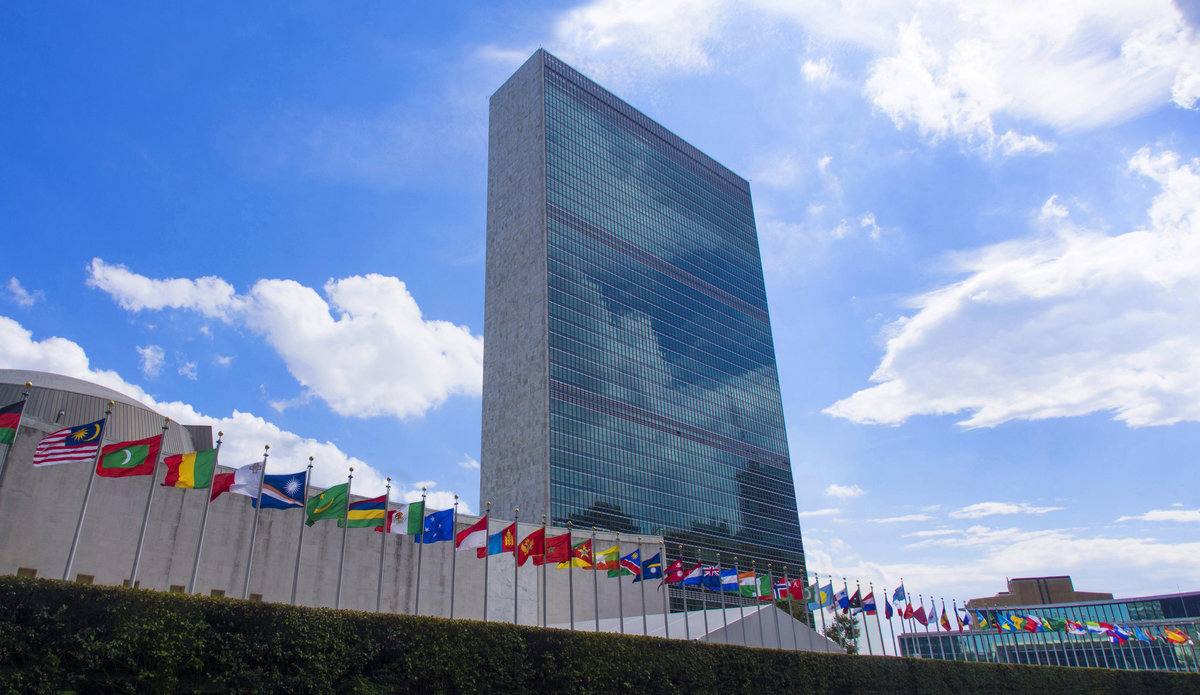 Speaking on behalf of the European Union on Oct. 10, the Special Envoy for Disarmament and Non-Proliferation at the European External Action Service, Jacek Bylica, condemned Iran’s breaches of the nuclear accord and called on “all countries to refrain from taking actions that impede the implementation of the JCPOA.”
Speaking on behalf of the European Union on Oct. 10, the Special Envoy for Disarmament and Non-Proliferation at the European External Action Service, Jacek Bylica, condemned Iran’s breaches of the nuclear accord and called on “all countries to refrain from taking actions that impede the implementation of the JCPOA.”
German Permanent Representative to the Conference on Disarmament Peter Beerwerth urged on Oct. 10 that Iran “extend cooperation to the IAEA on all relevant matters,” including with regard to nuclear safeguards. Tehran is obligated to implement a Comprehensive Safeguards Agreement and Additional Protocol in accordance with the Non-Proliferation Treaty and the 2015 nuclear deal, respectively. Beerwerth added that Germany “regret[s] the withdrawal of the United States from the JCPOA and the further re-imposition of sanctions against Iran by the U.S.”
Representatives from China and Russia expressed support for diplomatic efforts to preserve the continuity of the JCPOA. “China will work with all parties concerned to stick to the direction of solving [the] Iranian nuclear issue through political and diplomatic means,” Fu Cong of China said on Oct. 12 while noting that Beijing “resolutely oppose[s]” the U.S. imposition of sanctions on Iran. According to Russia’s Head of Delegation Vladimir Yermakov, “one can’t fail to note the fairly responsible and extremely restrained policy of Iran.” Yermakov said on Oct. 11 that “despite provocations and pressure Iran continues to implement its JCPOA obligations.”
“Iran alone cannot, shall not, and will not take all of the burdens anymore to preserve the JCPOA,” Ambassador Eshag Al Habib of Iran warned the Committee on Oct. 14. He stated that Iran’s until-now “reversible” breaches of the nuclear deal have been “aimed at bringing a balance to the JCPOA,” but threatened that a failure by the remaining members of the deal, particularly the United Kingdom, France, and Germany, to “preserve the JCPOA” would render them and the United States responsible for any “possible consequences.”
In Case You Missed It….
- International Crisis Group, “The U.S. and Iran: Maximum Pressure, Maximum Peril,” (video), Nov. 4, 2019
- Achim Vogt and David Jalilvand (eds), “One Year After the Re-Imposition of Sanctions: Perspective on the strategic implications of the US ‘maximum pressure’ campaign against Iran,” Friedrich Ebert Stiftung, November 2019
- Esfandyar Batmanghelidj, “New Trump Admin Channel for Iran Comes With a Killer Catch,” Bourse and Bazaar, Oct. 25, 2019
- William Burns and Jake Sullivan, “It’s Time to Talk to Iran,” The New York Times, Oct. 14, 2019
- Ariane Tabatabai, “Iran’s National Security Debate: Implications for Future U.S-Iran Negotiations,” RAND, October 2019
